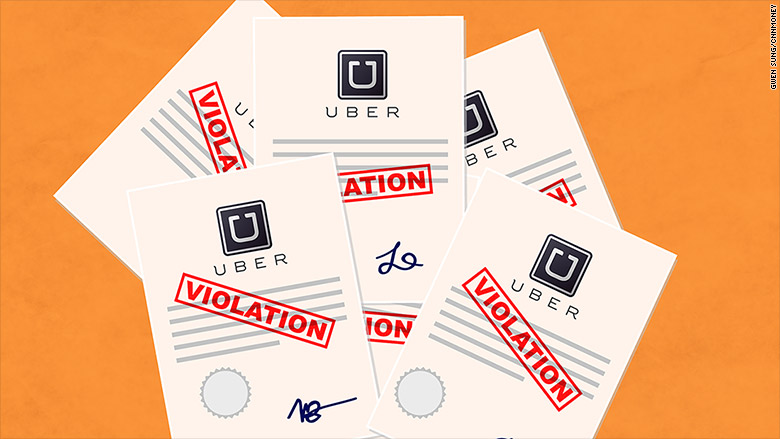
What do registered sex offenders, a kidnapper, identity thieves and a convicted murderer have in common?
Aside from being societal deviants, they all passed Uber's background checks in California.
That's according to a civil complaint filed against Uber by the district attorneys for San Francisco and Los Angeles. The document alleges that Uber misleads customers about their safety and the quality of driver background checks.
It's an amendment to a lawsuit filed in December against Uber.
The 62-page document calls out 25 instances where Uber's background checks failed to turn up felonies, misdemeanor charges and citations in its drivers' pasts. It let the following people slip through the cracks and into the driver's seat.
One Uber driver was convicted of second-degree murder in 1982. He spent 26 years in prison, was released in 2008 and applied to Uber. A background report turned up no records relating to his murder conviction. He gave rides to over 1,100 Uber customers. Another driver was convicted on felony charges for lewd acts with children. He gave over 5,600 rides to Uber customers. Yet another was convicted of burglary and identity theft.
How is Uber, the most valuable startup in the world, letting this happen?
Uber doesn't use a fingerprint identification test. That means it can't ensure that the personal identifiers drivers provide (like license and social security number) are actually theirs. It also means that Uber is limited in the databases it can search (it uses commercial databases as opposed to state and federal ones). As a result, Uber's results only go back seven years.
Uber has said its background checks are superior to that of taxi companies. Taxi companies, however, rely on fingerprint tests, making it possible to pull drivers' entire criminal history.
As alarming as this might all sound, Uber's background check process is not illegal. But the California complaint takes issue with Uber's misrepresentation of its commitment to safety.
Uber's "false and misleading statements are so woven into the fabric of Uber's safety narrative that they render Uber's entire safety message misleading," reads the complaint.
The complaint cites a number of Uber's bold claims about its thorough background checks, including that they "exceed any local or national standard," and that they include a "lifetime disqualification for sex offenders." Claims like these are impossible given the lack of biometric identifier and limited history.
"I support technological innovation," said district attorney George Gascón in a statement sent to CNNMoney. "Innovation, however, does not give companies a license to mislead consumers about issues affecting their safety."
In July, Uber posted information about its safety processes. It acknowledged that there were people with criminal records on its platform, including sex offenders, but maintains that both background check systems are imperfect.
"We disagree that the process used by taxi companies is an inherently better system for screening drivers than our background checks," read an Uber statement. "The reality is that neither is 100% foolproof."
Uber claims that running background checks for the past seven years, and not further back, protects the public while also giving ex-offenders employment opportunities. Uber said it looks forward to resolving the issue with the district attorneys.
This isn't the first time that Uber has been slapped with a lawsuit for failing to adequately protect its riders. It was sued in January by a women who alleges she was raped by a driver in New Delhi.
It is just the latest regulatory battle the company is facing in California. It is also being sued for employing contractors instead of full-time workers, and it was recently fined $7.3 million for not complying with regulations in California.

